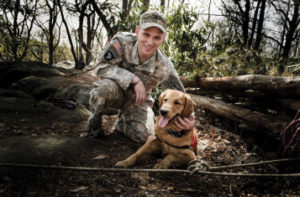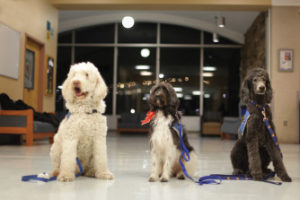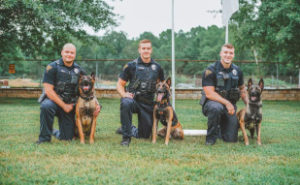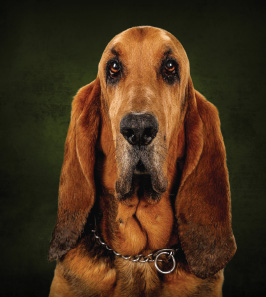West Virginia’s Service Dogs
By Samantha Cart
When West Virginians think about frontline heroes—those fighting for our physical, mental and emotional well-being and keeping us safe from all types of harm—most minds immediately jump to thoughts of the brave men and women serving our state. However, what some Mountaineers may not realize is that not all the state’s heroes are human—some have paws. From West Virginia International Yeager Airport’s wildlife patrol dog to the Huntington Police Department’s K-9 Unit, these furry, four-legged fighters are making the Mountain State a safer, happier and healthier place to live.
West Virginia International Yeager Airport’s Wildlife Patrol Dog
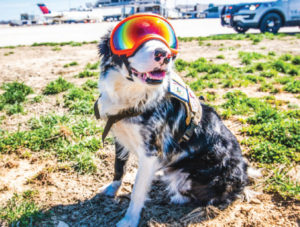 As travelers well know, West Virginia International Yeager Airport (CRW) sits on top of a mountain, which means many birds and wildlife are part of the natural landscape. Keeping wildlife off the runway is crucial as planes land and take off, which is where Hercules, CRW’s wildlife patrol dog, comes in. His job is to prevent bird strikes in order to keep passengers and military members safe.
As travelers well know, West Virginia International Yeager Airport (CRW) sits on top of a mountain, which means many birds and wildlife are part of the natural landscape. Keeping wildlife off the runway is crucial as planes land and take off, which is where Hercules, CRW’s wildlife patrol dog, comes in. His job is to prevent bird strikes in order to keep passengers and military members safe.
“Hercules is one of our airport’s greatest assets,” says Paige Withrow, CRW’s marketing manager. “He spends most of the day out on the runway chasing off birds. Some of these birds, like starlings and killdeer, begin to see Hercules as a predator, which causes them to stop coming to the airfield to eat. So far, he has reduced our wildlife population by 75%. That percentage is priceless when it comes to the safety of our passengers.”
Hercules is a border collie originally from Fly Away Geese, a wildlife nuisance management company in North Carolina. While he is now five years old, he began his training when he was only a few weeks old.
“Fly Away Geese specifically trains dogs to chase birds away from properties,” says Withrow. “Their model offers humane, PETA-approved solutions to a specific environmental niche. Hercules learned a range of verbal and whistle commands during training, which his handler, Chris Keyser, uses daily.”
Because the airport is operational 24 hours a day, Hercules is always there. However, he is never alone and never caged. When Keyser goes home, Hercules spends time in the Airport Response Coordination Center (ARCC), where he has befriended a range of operations specialists.
“He has a lot of toys, clothes, gear and, most importantly, several soft beds throughout the ARCC,” says Withrow. “His favorite place to sleep is under the main ARCC desk, right at the feet of his friends.”
While Hercules spends most of his time working in the field, he also acts as a comfort animal, helping nervous passengers feel more at ease before they travel.
“The ease our passengers have knowing Hercules is keeping the runway free of birds and preventing potentially dangerous bird strikes makes the airport safer and more successful,” says Withrow. “A flock of birds or sometimes just one bird can take a plane down. When a bird is ingested into the engine of an aircraft, it does a lot of damage. If the aircraft is in flight, it can bring down the plane. Our passenger safety is paramount and our priority.”
CRW staff often joke that Hercules is the favorite employee with the best job, and as such, his health and wellness is top priority. He meets with his vet often for checkups.
“Hercules is a working dog, and he works hard. He runs between three and five miles a day, which can be a lot on a dog. When Hercules retires in a few years, he will go live happily with Chris, where he will spend the rest of his life as a house dog who will be able to run throughout the woods and go on fishing or camping trips,” Withrow says.
Hearts of Gold Service Dogs
While Hercules is making the runway safe for West Virginians to take flight, graduates of the Hearts of Gold Service Dogs program are helping make the campus at West Virginia University (WVU) a more inclusive and supportive place for students and staff.
The program was born out of a collaboration between WVU and The Human Animal Bond, Inc., a local nonprofit organization with a mission to conduct research, education and training on the human-animal bond in order to benefit both human and animal quality of life.
“Hearts of Gold fulfills this mission by offering several classes at WVU that teach students about disabilities in society and how to train dogs to help individuals with disabilities, whether it be service dogs, therapy dogs or emotional support dogs,” says Dr. Lindsay Livengood, lead trainer, instructor and behavior consultant.
Hearts of Gold is partly funded by a grant from the U.S. Department of Defense that directs staff to place high-quality service dogs with veterans with mobility and psychiatric disabilities. This directive is completed with also training the therapy visitation dogs placed on WVU’s campus.
Livengood began working with Hearts of Gold before its inception in 2007. She helped design and deliver instruction in the courses at WVU and training programming for the dogs from puppyhood to graduation, care for the dogs, raise funds and promote community outreach. She is still involved in most major decisions and training plans for the program, but her main focus now is academics and research. While the elective training courses she helped create are not currently part of a larger academic major or minor at WVU, she hopes to see a minor or certificate program in the future when funding allows.
There are currently eight therapy visitation dogs on campus at WVU:
- Heidi, WVU Shared Services Center
- Lily, WVU College of Education and Human Services
- Lucas, Health Sciences Center
- Omega, Reed College of Media
- Rigatoni, WVU Medicine Children’s Hospital
- Ruby, Student Success Center
- Ryder, Davis College of Agriculture, Natural Resources and Design
- Titan, WVU School of Pharmacy
“All the dogs entering our program begin with the goal of ultimately being a service dog, so they all get the same training up until a decision is made on the type of placement,” says Livengood. “In my opinion, having the dogs available shows students that WVU cares about them and their mental health and is doing something to help with their first time being away from home. Many students miss their family pets dearly and being able to have dogs on campus can really help with that. I also think the dogs promote a more relaxed, laid-back atmosphere, which can be really helpful for students with anxiety.”
Huntington Police Department K-9 Unit
The Huntington Police Department’s K-9 Unit consists of six dual purpose canine teams with three main responsibilities: tracking criminal offenders and missing individuals, narcotics detection and criminal apprehension.
The unit is currently working three German shepherds and five Belgian Malinois purchased from Tarheel Canine in Sanford, NC, according to Cpl. Kyle Patton.
When taking on a new officer, the department purchases what is called a green dog, meaning all their training is done with the Huntington Police Department, not prior to. Once the dogs have completed their training within the department, they are then certified through the West Virginia Police Canine Association (WVPCA).
“We conduct training twice a week for four hours, and once a month we have an eight-hour training day,” says Patton. “The handlers are also responsible for training on their own. All our K-9s live at home with their handler and their families. The police department’s K-9s usually work until they are eight or nine years old, and then they retire and live with their handler and family.”
While the dogs are not deputized, they are considered a member of the Huntington Police Department and are treated accordingly. When they are off duty, they blend into their handler’s families and enjoy everything non-working dogs do. On duty, the Huntington Police Department K-9 Unit assists in many areas within the department, including bringing additional skills to the job that enhance officers’ ability to make Huntington safer.
“They give us a different perspective when searching for things such as evidence, drugs or people. They definitely make it easier to catch fleeing suspects,” says Patton. “We assist patrol with narcotics detection on vehicles, the tracking of fleeing suspects and missing individuals, alarms and building searches. The K-9 unit also works with the Huntington Police Department SWAT team, Huntington Violent Crimes Drug Task Force and the detective bureau. The K-9 unit also has opportunities to do demonstrations at schools, daycares and other public events in the tri-state area.”
Patton is particularly grateful for the support of Spike’s K9 Fund, a nonprofit for working dogs that has provided the department’s dogs with ballistic vests and an obstacle course at Barboursville Park.
West Virginia Division of Forestry’s K-9 Investigative Unit
American Kennel Club bloodhounds Raisy and Boone make up the West Virginia Division of Forestry’s K-9 Investigative Unit.
For 25 years, dogs have lent their hunting and tracking skills to the division’s Special Operations and Enforcement Unit to track down arsonists who start forest fires, missing children and lost hikers. Raisy and Boone work alongside assistant state foresters and investigators Don Kelley and John Bird.
The dogs have undergone years of rigorous training with the WVPCA to certify their tracking skills. These annual certifications are what make the evidence they find stand up in court. In 2017, Raisy and Boone were named the WVPCA’s K-9 Team of the Year. They have assisted on hundreds of local cases and have also traveled to assist law enforcement in Arizona, California, Georgia, North Dakota and South Dakota.
“These canines allow us to gather information by following a trail a suspect has traveled and identifying those suspects,” says Kelley. “To date, they have helped solve 233 arson cases and that does not include the numerous missing persons cases.”
Kelley and Bird agree that one of the most enjoyable parts of their job is taking Raisy and Boone on school and public appearances.
“Many times when I run into someone, they will remember Raisy but not me,” Kelley says.
Kelley is Raisy’s handler. He says K-9s are usually able to fill this type of position for approximately 10 years, and Raisy is still in excellent health.
“Raisy and I have been together since she was eight weeks old,” he says. “She is the fifth canine I have had the privilege to handle for the division. They give you a unique opportunity to solve cases that would otherwise go unsolved. We have also had the opportunity to travel and assist federal agencies across the country.”



